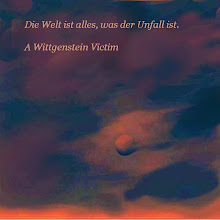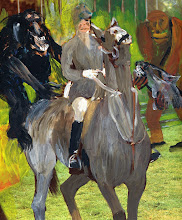"The automaton moon above the forest of numbers - every star an official secret"
What does the game of dice mean for Mallarmé? ('Today's game has blinded me' - Hafis) His premise: no throw of the dice can abolish chance. Isn't that obvious? Why would a game of chance be designed to suspend or destroy its own conditions - chance? If it were possible - would that be desirable? Is it a tragedy that chance survives all or any throws of the dice? Wouldn't life be even more boring without chance? Isn't chance the only guard against ennui and tyrannical habits? One often speaks of pure chance. Although chance has nothing pure about it. Chance is indiscriminate and banal and reeks of the mechanical. I would rather abolish a duty than leave it to chance. Chance is something which interrupts a set course. It is a non-intelligent intelligence which surpasses and limits the 'Absolute'
"faux manoir
tout de suite
évaporé en brumes
qui imposa
une borne à l'infini" ("Un Coup de Dés")
- yet chance and law are never far apart - if only the law of probability and stochastic processes. Chance refers commonly to all phenomena which appear to take place without the interference of some sort of conscious Will - as if of their own accord. But chance itself interferes in the phenomenon of Will. The reasons for things called 'chance' are simply unknown. Chance is just another name for the unknown or not yet known or semi-unknown. Chance is not necessarily unforeseeable or even surprising. Otherwise how would one be able to predict some sorts of chance to a fairly accurate degree - like the movements of the stock market or the outcome of horse races. Successful predictions do not abolish chance either. The idea of risk is a limit to chance - it implies those circumstances when chance outweighs predictability - one risks the difference. Risk is on one side - chance is on the other.
Someone who has no chance is a person whose situation is probably completely known. As Odilon Redon says in a journal entry dated 1908 "Le peintre qui a trouvé sa technique ne m'interesse pas."(An artist who has found his technique does not interest me. "à soi même, journal 1867-1915", 1989, p.110) There is no lingering remnant of the unknown or "l'imprévu", the unforeseen. All is lit up. Curiously this situation is considered hopeless. Humans associate hope with the unknown - when much is still in the dark and vague.
Vagueness is a great inducement for thinking. Once Wittgenstein began to contemplate the properties of vagueness he became disenchanted with the clear-cut world of logical atomism. "Grammar", the demiurge of his later philosophy, is the epitome of vagueness. The real futility, the exhausting kind, is the attempt to efface certain iron rules of logic. Unfortunately, one never knows exactly what these are. But even the most unassailable logic can never compel belief.
What is the relation between vagueness and chance? Is chance vague? Are bodies vague or is vagueness only an attribute of language or other forms of representation? Does vagueness occur first in thought? Thoughts can be very vague - as can perceptions. Every thought, says Mallarmé, is a throw of the dice. Then are throws of dice also vague? Vague thoughts, perceptions and language are on one side and on the other side are bodies which are not vague. Vagueness has no empirical substance. Although memories of empirical reality can also be very vague, especially memories of feelings.
The exactitude of language camouflages the inexactitude of thoughts - one can substitute vagueness for inexactitude - feeling, memory or perception for thought . Only rarely, does inexact language disguise exact thoughts. Novalis says though - the vague or indeterminate moods augur happiness.

















.jpg)














No comments:
Post a Comment